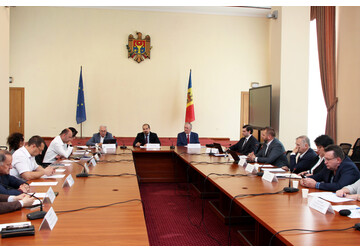
The increase in the minimum wage in the economy was discussed at the meeting of the National Commission for Consultations and Collective Bargaining
Representatives of the state, employers and trade unions once again discussed the increase in the minimum wage and its relationship with the European Directive and the political commitment of the government to gradually increase it to 10,000 lei. Vice-President of the National Trade Union Confederation Sergiu Sainciuc noted that the increase in the minimum wage to 6,000 lei from July 1, requested by the trade unions, will have a beneficial effect on the national public budget revenues, and will also stimulate domestic consumption. At the same time, he noted that the data of the National Bureau of Statistics for 2024 indicate that the average subsistence minimum last year for an able-bodied person and a child dependent on him/her has already exceeded 6,120 lei (until now, trade unions used only the data for the first half of 2024 in their calculations). In this case, and against the backdrop of rising inflation, the gross minimum wage to cover the subsistence minimum should today be 7,113 lei. And to ensure that the minimum old-age pension is calculated from the minimum wage (from April 1, 2025, for a minimum pension of 3,055.65 lei), it is necessary to obtain a net minimum wage of at least 6,657 lei. Minister of Labor and Social Protection Alexei Buzu said that the government proposes to establish a corridor within which the minimum wage will develop, and it should be planned in accordance with macroeconomic indicators, as well as to ensure a predictable annual calendar of negotiations. "We do not believe that a fixed formula is the optimal solution in the current economic context marked by uncertainty," he emphasized. Representatives of the Ministry of Finance emphasized the impact of the increase in the minimum wage on the state budget, noting that work is underway to reform the wage system in the budgetary sector, and the minimum wage should be correlated with this. The executive director of the National Confederation of Employers of Moldova, Vladislav Сaminschi, stressed the importance of predictability for the business environment: "We support the increase of the minimum wage to 6,000 lei, but it is also extremely important to support the real sector in order to support this increase and combat the informal economy. We also believe that the current tax burden on legal businesses is high and requires a balanced approach," he said. Igor Krapivka, a representative of Orvento Metal Trading Company, said that "increasing the minimum wage primarily puts pressure on legal businesses, which are already strangled - by electricity and gas tariffs." According to him, the compensations provided by the government for businesses do not solve anything, since, in general, enterprises are not economically competitive. He also noted that regulating the minimum wage does not play a leading role, especially given that employers can legally bypass the burden of social taxes - employing people at 0.5 or 2/3 of the rate. "The lion's share of businesses do not operate at full capacity - employees are provided with flexible hours or part-time work, etc. It should also be borne in mind that when we try to increase wages using political methods, the pressure does not go to all businesses. Firstly, we have regionalization of wages: in Chisinau, wages are 30% to 50% higher than in the regions, and the minimum wage is raised equally. This is a sensitive issue for small, medium and small businesses in the regions. Secondly, there is a large share of illegal business, especially in agriculture and the construction industry," said Igor Krapivka, emphasizing that, in an effort to move to the European standard of minimum wage, it should be borne in mind that the main task is to legalize the wage fund. Recall that from January 1, 2025, the minimum wage in Moldova is 5,500 lei per month. In 2024, it was 5,000 lei, in 2023 - 4,000 lei. According to the National Bureau of Statistics, the subsistence minimum in 2024 was on average 2,963.8 lei (from 2,776.7 lei in villages to 3,357 lei in large cities). On average, the subsistence minimum in the country was 2,947.7 lei - per child, 3,172.6 lei - per working-age resident, 2,475 lei - per pensioner.. // 16.05.2025 — InfoMarket







